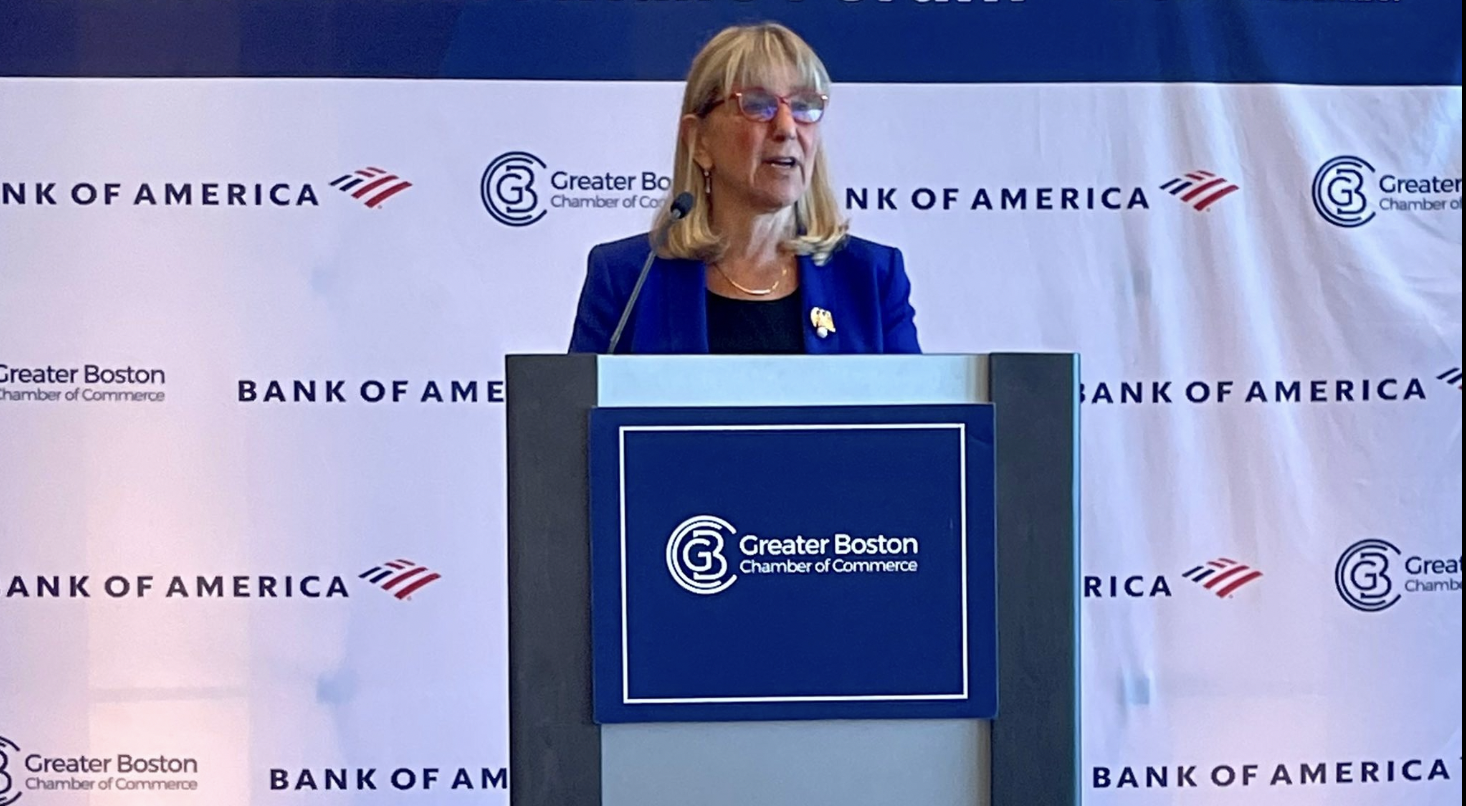In full transparency, the following are the remarks delivered by the Senate President this morning, June 21, in Boston. Senate President Karen Spilka (D-Ashland) represents Ashland, Framingham, & Natick in the SOURCE coverage area. (photo courtesy)
***
[broadstreet zone=”59945″]
It is a great honor to speak with you today. As the Senate heads into the final month of formal sessions, we are poised to try to tackle some of the big issues facing the people of the Commonwealth, and I am feeling optimistic about what we have accomplished and what I believe we can accomplish by working with our partners in the House and the Baker Administration.
Just last week, the Legislature sent the Governor a conference committee VOTES Act, designed to increase voting access by enacting vote-by-mail and expanded early-voting options, widely used in the 2020 election, on a permanent basis. It was my hope that this legislation would include same-day voter registration. Although we couldn’t reach a compromise on this provision, I will continue to advocate for its adoption, as so many Senators remain in favor of this provision.
We also recently passed our Fiscal Year 2023 budget, in which the Senate prioritized workforce development so that employers have access to a larger pool of local talent to hire and partner with. Together with our first ARPA allocation, we have made historic investments in the Workforce Competitiveness Trust Fund, Adult Basic Education, our cybersecurity workforce in partnership with our public community colleges and universities, as we in the Legislature believe the Commonwealth can and should be a leader in cybersecurity, because we see it as a natural priority, and organizations working with people displaced from jobs during the pandemic, historically underserved populations, and individuals reentering their communities from the corrections system.
Finally, despite our current economic uncertainty and all our recent investments in our people, the Commonwealth’s Rainy Day Fund has never been higher. As Ways & Means Chair and now as Senate President, it has been my priority to grow our rainy day fund, and I’m proud to say that it’s now over $6 billion. So when we need it next, we’ll be prepared.
[broadstreet zone=”59983″]
As for the Student Opportunity Act, many of you know that I ran for the Legislature on this issue, because I wanted to achieve real transformative change for all of our students. That’s why I’m proud that, in our recent budget, we invest a record $6 billion in Massachusetts public K-12 schools, thereby providing students with high quality educational opportunities while addressing pandemic costs—and keeping us on track to fulfill the promise of the Student Opportunity Act in seven years.
We also doubled the increase in the amount of local aid to cities and towns, to $1.2 billion, and invested over $900 million in increased funding towards housing stability and assistance to those living with homelessness. The measures we’re taking, including subsidizing rents and the cost of moving, provide concrete help to individuals and families experiencing housing instability while preventing costs from being passed on to local landlords.
As we continue to emerge from the COVID-19 pandemic, it is more important than ever that we ensure that the Commonwealth not only maintains but grows its economic vitality while ensuring the wonderful quality of life we aspire to here. And as we rethink the way that we work, our priorities in a post-COVID world, and grapple with economic realities in an inflationary environment, it’s clear that there are aspects of our economy and our society that just aren’t serving us well anymore.
When it comes to both early education and care, and mental and behavioral health, it seems as if we are still trying to exist in a post World War II structure, where men were assumed to be the primary breadwinners and no one talks about their feelings. But think of everything we have achieved since then—not only have we put a man on the moon, we now carry tiny powerful computers in our pockets. We’ve passed marriage equality, and we’ve made great strides in rights for women, our trans brothers and sisters, and immigrants—and we continue to work towards a more just and equitable Commonwealth for
all.
[broadstreet zone=”59946″]
Much of the technology used to propel our world forward—and the groundbreaking social policy used to propel our society forward—was invented right here in Massachusetts. Yet our antiquated beliefs about child care and mental health—and the systems we’ve built to support them—are dragging us down, and need to be urgently addressed if we are to remain economically competitive.
Take early education and care. Before the pandemic, women in Massachusetts were participating in the workforce at increasing rates, surpassing the national rate by 2019—but the pandemic has brought women back to where they were after the 2009 recession. In fact, the percentage of women participating in the U.S. labor market in October 2020 was the lowest since 1988. And while a February 2022 Bureau of Labor Statistics report shows that men have now recouped all their labor
force losses since February 2020, over 1 million fewer women were in the labor force in January 2022 as compared to February 2020. Given how many women either need to work or prefer to work, this reflects an unsustainable trend.
But a lack of affordable early education and care options dampens the economy in other ways too.
According to a recent news article, parents of a four-year-old in Massachusetts can expect to pay 27 per cent of a typical family’s wages on child care—the highest percentage of any state in the U.S. except for Hawaii. In fact, the Economic Policy institute has pointed out that childcare workers themselves cannot afford childcare – because the cost of childcare in Massachusetts is more than 75 percent of the wages earned by a typical childcare worker, which is truly outrageous.
And so I’m proud to report that the Senate is tackling this issue from many different angles—and I’m also excited that there is action in the Legislature to address this important issue this session.
[broadstreet zone=”59947″]
In our Fiscal Year 2021 budget, we created a Special Legislative Early Education and Care Economic Review Commission. That commission submitted its final report in March 2022, and included some pragmatic recommendations for the Legislature in the areas of stabilization, family affordability and access; and workforce compensation.
I’m excited to announce that the Senate will be releasing a bill shortly. This legislation, if and when it is fully implemented, will be transformative in expanding access to high quality, sustainable, and affordable early education and care for young children and families in Massachusetts. It also recognizes that our workforce needs significant supports, through salary, and education and training. To provide a crucial down payment on our efforts to shore up childcare and early education, the Fiscal Year 2023 Senate
budget invests a record $1.13B to transform the childcare system, an increase of $309.6M over FY 2022.
The Senate budget also formalizes the practice of reimbursing providers based on enrollment rather than attendance, which will provide more stable payments for our early educators. We also dedicate a new $250M to continue the Commonwealth Cares for Children (C3) Stabilization Grant Program through at least the end of the calendar year. We believe that the C3 grants provide the bedrock funding necessary for the continued development of this sector. And, in recognizing that we need to do more for all our providers, particularly subsidized providers, we are putting this provision in our budget to demonstrate the Senate’s commitment to funding this year after year.
[broadstreet zone=”53130″]
I’m optimistic our House colleagues will support these critical infrastructure investments.
With implementation of the SOA well underway, I believe that it’s time to turn our attention to early ed and care—and pursue the same type of transformational change in a multi-year process. The business community has been at the table on the early education and childcare issue – and we need you to stay. With your support, we can continue to shore up our childcare and early education infrastructure to better serve our businesses, our communities, our families, and most importantly, our children.
Another area where we can’t let the systems of the past impinge on our future is mental health.
I’d like to start by saying how grateful I am to Speaker Ron Mariano, Chair Adrian Madaro, and the entire House for passing their version of the Mental Health ABC Act 2.0 last week. I am extremely hopeful that we will finally get a comprehensive reform bill done this session, and it can’t come soon enough.

In this post-pandemic, inflationary environment, the stress of finding childcare, putting food on the table, and keeping a roof over your head is detrimental to our overall wellbeing, and yet our mental health care system remains broken, disrupting both people’s lives and our economy
According to the Lancet, poor mental health was estimated to cost the world economy approximately $2.5 trillion per year in poor health and reduced productivity in 2010, and—in part due to the effects of the pandemic—that cost is projected to more than double to $6 trillion by 2030. So, investing in mental and behavioral health makes good sense all around. In fact, according to the World Health
Organization, for every $1 put into scaled up treatment for common mental disorders, there is a return of $4 in improved health and productivity.
That’s why, for Fiscal Year 2023, the Senate budget includes over $1B for mental health supports. These investments are paired with $400M from the American Rescue Plan Act legislation, primarily focused on building and sustaining this much-needed workforce.
Just two weeks ago, I attended the commencement ceremony at William James College, where they are intentionally working to foster a new generation of diverse mental and behavioral health professionals who can help us build the future when it comes to mental health access and care.
The Senate also included funding for a mental health clinician loan forgiveness program, a student telebehavioral health program and a public awareness campaign, and $15M in capacity-building initiatives to tackle the heartbreaking reality of emergency department boarding, along with an additional $100M plus to provide tools to sustain momentum around increased SEL supports, children mental health supports, and to Family Resource Centers.
[broadstreet zone=”54526″]
And because substance use disorder is so often the result of unmet mental health needs, the Senate also dedicates significant funding in this area, including $209.3 million for a complete range of substance use disorder treatment and intervention services to support individuals and their families.
It’s clear that the need for mental health care has risen to the top of the agenda for many, and that may be one of the very few silver linings of the pandemic. I’m proud of all the work the Senate has done to advance this critical issue—and I hope you will all join us in getting this over the finish line—and then let your employees take the time they need to access mental health care! It will truly benefit us all.
Another area where our past threatens our future is our transportation system. By now, we’ve all read about the damning Federal Transportation Authority report. If Jim were here, I know he’d have something to say about this. As he stated in the Globe, safety concerns are a top reason why employees are hesitant to return to work—and you have to wonder, what is stopping them from looking for work elsewhere? And we all know that when employees leave, employers are often forced to follow.
It’s high time that Massachusetts has the public transportation system to match the values and aspirations of its residents, not just here in Boston but throughout the entire state. As a Commonwealth, we need to take a comprehensive look at what we have, what we want, where we’re going and how we pay for it—statewide.

This is important not only to provide a top-notch transportation system, but to reach our climate goals as well. In the climate bill now in conference committee, the Senate focused on electrifying our public transportation and cars, which is essential to reaching the future we envision.
Just this morning, the Speaker and I are announcing our support for continued discussions on East-West rail, including the $50 million we included in the last transportation bond bill, with the intent to include significantly more in the upcoming one. I’m hoping that the creation of this new transportation system will open up opportunities for economic development, just as the South Coast rail and the Green Line extension have do.
But we can’t just focus on these large-scale projects at the expense of the Regional Transit Authorities that service our local communities, and that’s why the Senate added $2.5 million in our budget for RTAs for the first time to explore opportunities for means-tested, discounted or fare-free pilot programs. And although I am disappointed the Governor vetoed the Senate’s attempt to move forward on a low-income fare program at the T and the Commuter Rail last session, I am looking forward to continuing that conversation with my colleagues in the upcoming transportation bond bill currently moving through the
legislature. As that bill moves, we will continue to have these important discussions on the future of transportation in our state, and I look forward to the Boston Chamber continuing to be a partner in those talks.
[broadstreet zone=”59982″]
Finally, the Speaker and I have also announced this morning that the Joint Committee on Transportation will hold an oversight hearing on the MBTA. The Federal Transit Administration’s findings and the MBTA’s subsequent service cuts don’t inspire public confidence in our transit system. Given the FTA’s interim findings and alarming directives there is an increased need to better understand the agency’s shortcomings and help restore public confidence, and so we need to learn more so that the Legislature can help ensure the T returns to safe and reliable service.
Finally, I believe our state’s strong financial position means that the Legislature can safely balance targeted spending, in areas like housing, childcare and higher education, with tax relief for individuals and families, and other ways to put money back in people’s pocket.
Last year, the Senate converted tax deductions for young children, elderly or disabled dependents and business-related dependent care expenses into refundable tax credits. This meant an additional $16 million to 86,000 low-income working parents and caregivers, thereby helping to lift families out of poverty, and we were happy to see the Governor expand this
Senate initiative in his tax relief proposal, as these are dollars that go directly back into the economy.
In addition, the very first commitment we made with funds from the American Rescue Plan was a billion-dollar investment.
[broadstreet zone=”59940″]
We put $500 million towards businesses, in the form of unemployment insurance relief, giving them more resources to hire, innovate and invest back into the economy, and $500 million to frontline workers who couldn’t telecommute and who put themselves at risk, providing $500 checks for those who can use it the most. $500 payments were delivered to nearly 240,000 people in March in the first round of the program, and the second round is distributing $500 checks to approximately 300,000 additional workers this month—a phenomenal number.
We are currently in discussions about a tax relief proposal, which may include changes to the Earned Income Tax Credit and the estate tax, among others. We will continue to ensure that Massachusetts is open, competitive, and inclusive, and that these same values guide our tax relief proposal.
As I conclude, it is clear that we have a lot of work ahead of us. But I am, as I said, I am hopeful about the future. Everywhere I go, I see people of all backgrounds and experiences wanting to row in the same direction when it comes to what is best for our children and families, our mental health, and our economy.
And it is indeed an honor to be in a leadership position in this time, even if it is a time of unprecedented change and uncertainty.
I’d like to thank all of you for your leadership in the business community, and for caring so very much about our Commonwealth. I look forward to our continued partnership.


